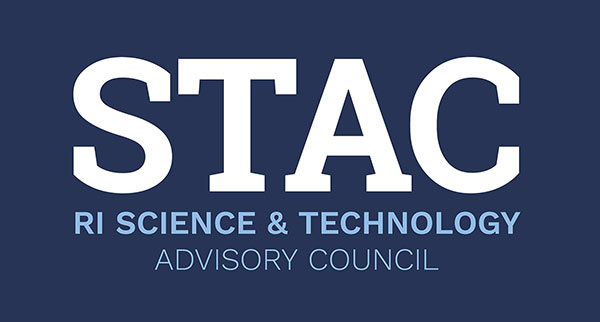Nine interdisciplinary research teams were selected to receive funding, totaling $795,154, from the Science & Technology Advisory Council (STAC) this year. Research projects directly address the RI NSF EPSCoR proposed program themes of:
- Assessing Impact: How do interactions between natural and anthropogenic stressors impact ecologically and commercially important organisms?
- Understanding complexity: How can our understanding of biological and ecological complexity be advanced, incorporated within and improve coastal ecosystem models?
- Improving sustainability: How does the environment affect humans and how can human behavior and responses be modified to improve costal and economic sustainability?
Nanofluidic Profiling of Marine Biopolymers: Synthetic and Sensing Tools for Environmentally- and Economically-Driven Aquatic Monitoring ($90,000)
This project will focus on designing of a low-cost tool to enable the economically important polysaccharide component of dissolved organic matter to be characterized at the molecular level.
- Jason Dwyer, University of Rhode Island
- Amit Basu, Brown University
Development of Underwater Sonar as a Technique for Assessment and Classification of Pelagic Fish ($76,926)
This goal of this project is to develop a methodology using sonar products aimed specifically at estimating pelagic fish biomass and identifying species.
- Austin Humphries, University of Rhode Island
- Jeremy Collie, University of Rhode Island
- Matt Zimmerman, FarSounder, Inc.
- Jason MacNamee, Rhode Island Department of Environmental Management
Development and Field Validation of a Novel Passive Sampler for Fluorinated Contaminants ($90,000)
This team will work on the development of a passive sampler for poly- and perfluoroalkyl substances, emerging contaminants in the water of the Narragansett Bay. Results from the experiments will be used to validate the uptake kinetics of these contaminants as a function of field conditions (time, temperature, flow regime) for future studies.
- Rainer Lohmann, University of Rhode Island
- Tom Uva, Narragansett Bay Commission
The Heat Is On: Measuring the Effects of Increasing Ocean Temperatures on the Growth and Grazing Rates of Marine, Single-Celled Herbivores ($89,983)
This team of researchers will quantify the temperature response of planktonic herbivores growth and grazing rates across a polar to tropical temperature gradient, naturally occurring in Narraganset Bay over the seasons.
- Susanne Menden-Deuer, University of Rhode Island
- Sarah Knowlton, Rhode Island College
Developing Detection Methoodologies for Combatting Cyanide Fishing ($89,503)
This project centers on combating the cyanide fishing practice and trade in such illegally obtained marine organisms by creating a hand0-portable chemosensor for thiocyanate ions in seawater. The development of this chemosensor has applications to aid in the biological assessment of the impacts of cyanide fishing, and will aid research in that area.
- Clifford Murphy, Roger Williams University
- Cliff Timpson, Roger Williams University
- Stephen O’Shea, Roger Williams University
- Andrew Rhyne, Roger Williams University
- Alfred Hanson, SubChem Sensor Systems, Inc.
Digital Technologies to Change Household Preparedness Behaviors to Reduce Risks from Natural Disasters ($89,987)
This project buildings upon state-of-the-art approaches to individualized communications designed to reduce risks which was first adopted in a pilot related to natural hazard preparedness. The project will also focus on preparedness and utilizes computer tailored interventions which are online, user-friendly programs that ask a series of questions and provide immediate feedback tailored to each users’ responses.
- James Prochaska, University of Rhode Island / Cancer Prevention Research Center
Evaluation of a Mobile Autonomous Surface Vehicle and Sampling System for Water Quality Monitoring and Coastal Estuarine Research ($89,951)
This project will focus on the evaluation of how Autonomous Surface Vehicles can be used to better understand and improve the effectiveness of routine coastal water monitoring.
- Christopher Roman, University of Rhode Island
- Roxanne Beinart, University of Rhode Island
- Elizabeth Scott, Rhode Island Department of Environmental Management
- Matt Ladewig, ESS Group, Inc.
Discovering Lipid Biomarkers in Marine Planktonic Predators: Food Webs to Biofuels ($89,521)
This project will work to quantify lipids in marine herbivores providing opportunities to use lipids as biomarkers for emergency demand and status in marine microbial predators and improve coastal ecosystems models.
- Tatiana Rynearson, University of Rhode Island
- Christopher Reid, Bryant University
- Susanne Menden-Deuer, University of Rhode Island
Microbiome of the Eastern Oyster Crassostrea Virginica in Health and Disease ($89,283)
This project is centered on understanding the functional diversity of oysters-microbe interactions which would bring new insights into the complex biological and ecological interactions between the oyster and microbes in the coastal water.
- Marta Gomez-Chiarri, University of Rhode Island
- Roxanna Smolowitz, Roger Williams University
- Ying Zhang, University of Rhode Island
TOTAL AMOUNT OF AWARDS: $795.154
